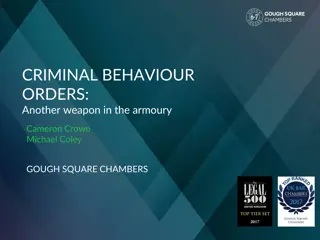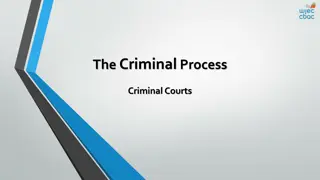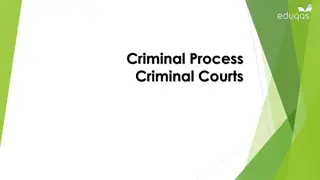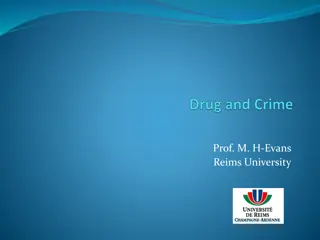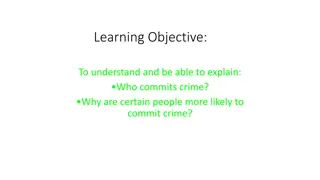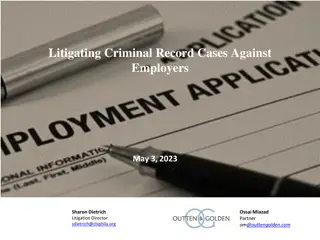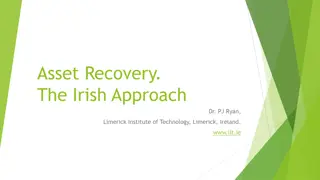The Apex Program: Advancing Through Pardons and Expungements
The Apex Program offers advancement through pardons and expungements in Delaware. Qualifications, criminal history report details, understanding the difference between being charged and convicted, examples of criminal dispositions, and information on pardons issued by Governor John Carney are covered in this comprehensive guide.
Download Presentation

Please find below an Image/Link to download the presentation.
The content on the website is provided AS IS for your information and personal use only. It may not be sold, licensed, or shared on other websites without obtaining consent from the author.If you encounter any issues during the download, it is possible that the publisher has removed the file from their server.
You are allowed to download the files provided on this website for personal or commercial use, subject to the condition that they are used lawfully. All files are the property of their respective owners.
The content on the website is provided AS IS for your information and personal use only. It may not be sold, licensed, or shared on other websites without obtaining consent from the author.
E N D
Presentation Transcript
THE APEX PROGRAM ADVANCEMENT THROUGH PARDONS AND EXPUNGEMENTS
INTRODUCTION Dominique Truitt New Castle County Coordinator 302-761-8256 (Office) 302-333-7605 (Cell) Dominique.Truitt@delaware.gov Andrew Duncan Downstate Coordinator Kent County: 302-233-6462 Sussex County: 302-333-7600 Andrew.Duncan@delaware.gov
BEFORE WE GET STARTED: DO YOU QUALIFY FOR OUR PROGRAM? A) You have never been convicted of an adult offense in Delaware. OR You have been convicted of an adult offense, but you have not been arrested, incarcerated, or on probation or parole in the past 3 years. B) You have no pending or unresolved charges. C) Your offenses are in the State of Delaware.
WHAT APPEARS ON A DELAWARE STATE CRIMINAL HISTORY REPORT?? ..EVERYTHING
UNDERSTAND THE DIFFERENCE I have been charged I have been convicted The individual was either found guilty or pled guilty to a charge placed against them. Any offense can appear on one s record; even if the charge was dismissed. In most cases, one receives a sentence of probation, incarceration, fines, restitution, community service, etc. The Date of Arrest will appear one one s record; even if a physical arrest did not take place.
EXAMPLES OF CRIMINAL DISPOSITIONS o Guilty- convicted of a misdemeanor and/or felony. o Dismissed-case is terminated; no guilty findings. o Nolle Prosequi- Latin phrase meaning will no longer prosecute ; non-conviction. o Probation Before Judgment(PBJ) - a non- conviction contingent upon successful completion of probation. o First Offender-type of diversion typically offered to one with no previous criminal record; non- conviction. o Juvenile found delinquent-a minor that is found guilty/adjudicated.
PARDONS Image result for john carney delaware GOVERNOR JOHN CARNEY
Pardons WHAT IS A PARDON? A PARDON is an official statement of forgiveness by the Governor. The Governor issues an official, signed letter to the pardoned individual. It indicates that the recipient is reformed, living a productive life, and no longer a threat to society.
Pardons WHAT DOESA PARDON DO? A PARDON can restore your civil rights, such as the rights to vote, hold public office, and own a firearm. A PARDON changes your criminal record to indicate that your offenses have been pardoned. A PARDON may be viewed favorably by employers and licensing agencies.
Pardons WHATA PARDON DOES NOT DO A PARDON does not erase the offenses from your criminal record.
Pardons WHOIS ELIGIBLE FORA PARDON? To be ELIGIBLE for a pardon: Your convictions must be in the State of Delaware, and not federal or out-of-state. You must have completed all phases of your sentence(s), including probation and parole. You may not be delinquent on payment of any restitution, fees, or fines from your offenses. You may not have any pending charges.
Pardons THE CRITERIA You are more likely to receive a pardon if: There has been a significant lapse of time since your most recent offense or arrest. You accept responsibility you acknowledge guilt, admit that you were wrong, & understand how you hurt others. You demonstrate remorse you show regret for your actions and are apologetic to those affected by your actions. You have demonstrated good citizenship volunteering, church involvement, supporting a family, employment, etc. You have pursued self-improvement getting an education, completing rehab, changing your people & places, etc.
Pardons THE PROCEDURES The granting of a PARDON requires two actions: 1. The Board of Pardons must recommend your application to the Governor. AND 2. The Governor must approve your pardon
Pardons TIMELINE The Board of Pardons meets monthly. However, once you submit your application, you will need to wait at least 6 months to appear for a hearing. If the Board recommends you for a pardon, the GOVERNOR will decide whether to grant your pardon about 6 months later. All in all, the whole process from beginning to end can take well over a year.
Expungements WHATISAN EXPUNGEMENT? An EXPUNGEMENT seals a criminal record, so that it does not appear on state-run background checks.
Expungements WHAT CAN BE EXPUNGED You may be eligible to apply for expungement in four scenarios: Scenario #1: Charges terminated in your favor: These are charges that do not lead to a guilty conviction. You are not likely to get these charges expunged if you have any convictions on your record at all.
Expungements WHAT CAN BE EXPUNGED You may be eligible to apply for expungement in four scenarios: Scenario #2: Pardoned misdemeanor convictions If you successfully obtain a pardon, you may be able to apply to expunge your misdemeanor convictions. However, adult felony convictions may not be expunged, even if they are pardoned.
Expungements WHAT CAN BE EXPUNGED You may be eligible to apply for expungement in four scenarios: Scenario #3: Juvenile Charges. Your eligibility depends on the number of juvenile charges, the severity of the offenses, & the time elapsed since the offenses. You are not likely to be eligible if you have both adult convictions as well as juvenile charges (unless you receive a pardon).
Expungements WHAT CAN BE EXPUNGED You may be eligible to apply for expungement in four scenarios: Scenario #4: Single Possession of Marijuana Conviction This means that any person convicted of a single offense of cannabis possession, use, or consumption, who would otherwise be eligible for a mandatory expungement under 11 Del. C. 4373 will be eligible despite their conviction when they were not prior to SB197 s passage.
Expungements WHATCANBEEXPUNGED Please note that this is only a general description of Delaware s policies on expungement eligibility. There are several further restrictions on eligibility, as dictated by the relevant laws and regulations.
Expungements APPLYING When you request an Expungement/Pardon Background Check from the State Bureau of Identification (SBI), they may be able to inform you of whether you are eligible to apply for expungement. If you are eligible, you will probably still need to apply to the Superior Court or Family Court, which will decide whether or not to grant the expungement.
THE APEX PROCESS STEP 1: Orientation Meeting STEP 2: Obtain your SBI Criminal History Report STEP 3: SBI Report Preparation STEP 4: Obtain Court Documents (Pardon Only) STEP 5: Interview STEP 6: Hearing Preparation (Pardon Only) STEP 7: Your Pardon Hearing (Pardon Only)
COSTS While APEX is a free service, you will incur costs from the State Police and the courts: PARDON Criminal History Report: $52.00 Court Records: $7 - $45 for each case If you have certain serious offenses, you may need to pay for a Mental Health Evaluation. EXPUNGEMENT Criminal History Report: $52.00 Filing Fee: $75 * If you are a client of a government social service agency, you may be able to request that it subsidize the cost.
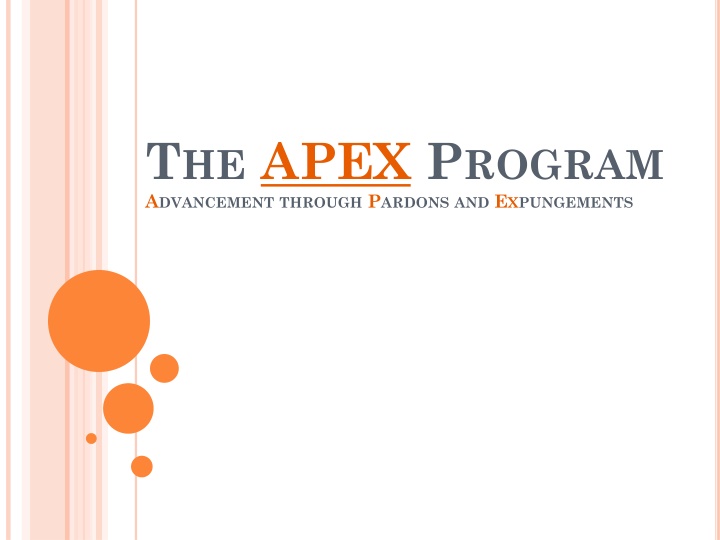



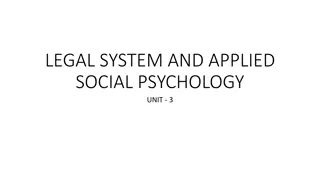
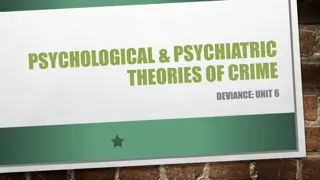
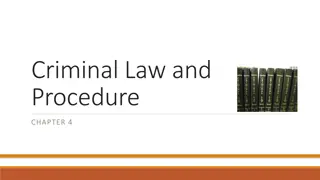
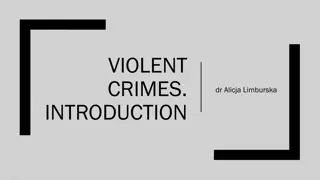
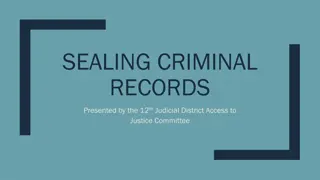
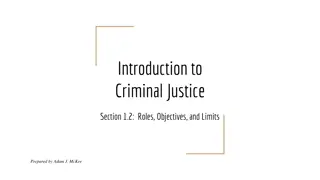
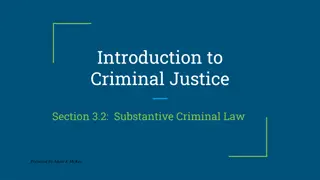
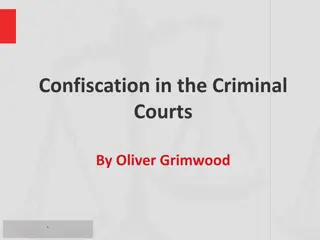
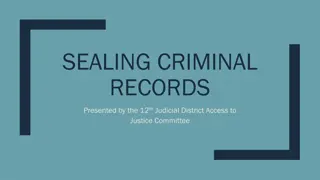
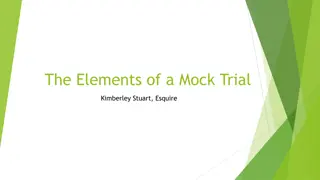
![Briefing on the Criminal Procedure Amendment Bill [B12-2021] to the Portfolio Committee on Justice and Correctional Services](/thumb/157093/briefing-on-the-criminal-procedure-amendment-bill-b12-2021-to-the-portfolio-committee-on-justice-and-correctional-services.jpg)
